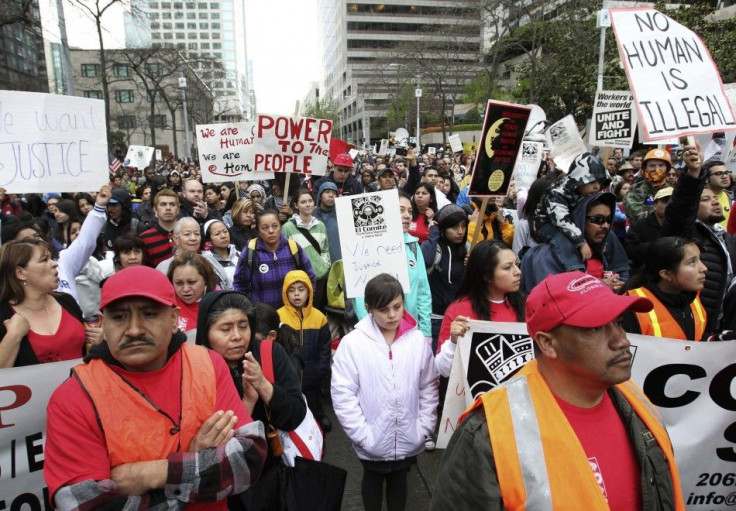Obama, Romney Use Arizona Ruling To Call For US Immigration Fixes

President Barack Obama and Republican challenger Mitt Romney both used the Supreme Court's Monday ruling on Arizona's controversial immigration law to reinforce their positions on immigration.
The issue has permeated the presidential race recently, with Obama's declaration that he would stop deporting some young undocumented immigrants preceding speeches by both men to the National Association of Latino Elected and Appointed Officials. Romney has criticized the president's order, calling it a cynical political move and faulting the president for not pursuing immigration reform, but has not said whether he would reverse it.
Arizona's immigration law helped ignite a national immigration debate by enacting tough new enforcement provisions -- including one requiring police officers to check the status of anyone they suspected to be undocumented immmigrants -- that legislatures in Utah, Georgia, Alabama and South Carolina emulated in passing tough new immigration laws of their own.
Monday's Supreme Court Ruling: Mixed Decision
The Supreme Court issued a mixed ruling on Monday. It struck down three of the four provisions it was considering -- one that made it a crime for undocumented immigrants to seek work in Arizona, one that made it a crime to not carry documentation, and one that allowed police to make warrantless arrests of immigrants police officers believed to have committed deportable crimes -- but kept in place the police checks mandate.
President Obama lauded the decision in a statement but expressed concern about the court upholding the police checks provision, saying in a statement that no American should ever live under a cloud of suspicion just because of what they look like. Obama called for humane enforcement of the law, something he said his administration pursued with the recent order to not deport some immigrants.
We will continue to enforce our immigration laws by focusing on our most important priorities like border security and criminals who endanger our communities, and not, for example, students who earn their education - which is why the Department of Homeland Security announced earlier this month that it will lift the shadow of deportation from young people who were brought to the United States as children through no fault of their own, Obama said.
Romney did not mention the specifics of the court's decision but again criticized Obama for not pursuing comprehensive immigration reform, saying in a statement that the ruling underscores the need for a President who will lead on this critical issue and work in a bipartisan fashion to pursue a national immigration strategy. He also endorsed Arizona's contention that it was acting because the federal government had not.
I believe that each state has the duty - and the right - to secure our borders and preserve the rule of law, particularly when the federal government has failed to meet its responsibilities, Romney said.
Romney Sees Arizona Law As National Model
During the Republican presidential primary, Romney praised the Arizona law as a national model. He also advocated a policy of encouraging self-deportation, embracing the Arizona law's guiding premise of attrition through enforcement.
The Obama administration challenged the law on the grounds that the federal government, not states, has the authority and responsibility to enforce immigration laws. President Obama reiterated that point in his response to the ruling, saying Congress needed to tackle reform to ensure that immigration law is enforced uniformly across the country.
A patchwork of state laws is not a solution to our broken immigration system - it's part of the problem, Obama said.
© Copyright IBTimes 2024. All rights reserved.











